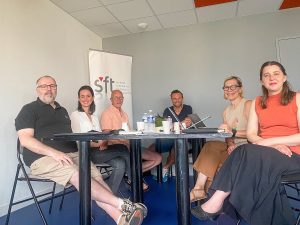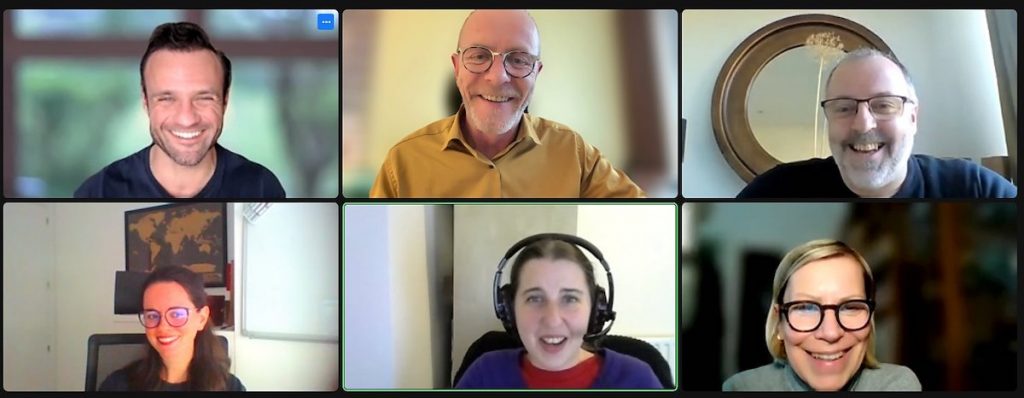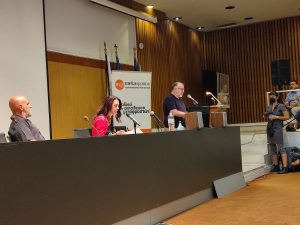FIT is a global federation of translators’ and interpreters’ associations that has been around for almost 70 years. In the last couple of decades FIT has set up regional centres in various parts of the world. Currently there are three such regional centres, in Europe, North America and Latin America. A new one is currently being set up in Africa with the hope that one will follow soon in Asia.
Membership has grown steadily in recent years.
FIT Europe is the largest of the current regional centres. It now has well over 70 members, representing –at a conservative estimate– about 45,000 professional translators, interpreters and terminologists all around the continent and membership has grown steadily in recent years. At the Statutory Congress held earlier this year in Cuba we saw member associations from various European countries such as Denmark, Ukraine, Estonia and others have their membership applications formally ratified. The family is continuing to grow too, since other European associations, seeing membership as attractive, have since applied.
So what exactly is a Regional Centre? It may help to think of FIT as the “parent company” in a multinational group, in charge of overall strategy and global issues affecting everyone, and the regional centres as “subsidiaries”, operating on the ground in various parts of the world and dealing with issues and concerns relevant to that “local” area. Tasked with achieving the same goals and objectives as the parent, but with their own geographical territory to take care of, Regional Centres have their own management body, the Board, elected by the member associations of FIT from that region. At FIT Europe, the Board is elected every three years, though the previous Board did serve for four years because of the pandemic.
In short, FIT Europe serves as a forum to help its member associations build better links to each other.
What are those goals and objectives? In short, FIT Europe serves as a forum to help its member associations build better links to each other –through exchanging information, experience and examples of best practice– and work on common issues and challenges in the specific region to find solutions to common or shared problems (and there are lot of them). It also serves to foster better understanding and awareness of translation and interpreting as professions, both among users of our services and among society in general.
It does so in various ways, for example, by:
- promoting the interests of language professionals in Europe, by
- participating in public consultations on translation/interpreting-related matters, like the recent consultation on relaxation of competition law rules that would allow translation associations to more effectively engage in collective bargaining,
- ensuring that the voice of the profession is heard by public/international organisations through lobbying and consultation,
- joining forces with other actors from the sector, and
- calling out bad practices like the use of poor-quality sound for remote simultaneous interpreting, which impacts the aural health of interpreters, or the making of exaggerated claims about what MT can do without concomitant efforts to improve machine translation literacy.
- encouraging recognition of the importance of translation and interpreting for society, for example by
- running social media campaigns to help organisations and individuals outside our sector better understand what it is we do and our importance, or
- sending members of the Board to speak about these topics at events.
- working together with other stakeholders, for example by
- conducting joint surveys with organisations representing other actors in the translation/interpreting sphere to capture the state of the sector every year and monitor trends and developments (the annual European Language Industry Survey), or
- jointly organising events.
FIT maintains open lines of communication with the European Commission and participates in the Language Industry Expert Group.
FIT Europe is not the only translation/interpreting-related organisation in Europe. In recognition of that fact, in recent years it has signed a number of MoUs with other bodies representing our professions around Europe, such as CEATL (representing literary translators) and AVTE (representing audiovisual translators) to forge stronger ties and work together to promote common interests. It also engages actively with the other side of the profession: organisations representing translation/interpreting agencies (such as ELIA, EUATC, GALA, etc.) to foster clearer understanding of how practices on that side impact individuals. It maintains open lines of communication with the European Commission and participates in the Language Industry Expert Group, a team of language industry experts who consult with and advise the Commission on translation/interpreting-related issues. It is also in regular contact with other international organisations within Europe. It also strongly supports the work of single-issue organisations such as Red T. These partnerships often manifest as concrete, joint actions such as the GDPR project, which was run together with EUATC and others with the aim of developing actionable guidelines for translators/interpreters and improving their understanding and implementation of data protection rules.
We live in a fast-changing world. Our professions have seen massive technological changes impacting translation and interpreting work in recent years, whether in the form of machine translation or remote simultaneous interpreting and the impact those technologies have on pricing and pay, or the hype surrounding tech. The last decade or so has also seen repeated crises within Europe: migration (with its clear repercussions for language provision), and more recently the pandemic, war, energy price rises and inflation. All have impacts on our professions in various ways.
Challenges require responses and FIT Europe has a large portfolio of projects under way to help address them.
These are major challenges facing individual translators and interpreters and their associations. Challenges require responses and FIT Europe has a large portfolio of projects under way to help address them. As a Regional Centre, FIT Europe strives first and foremost to understand the problem through a strongly data-driven approach, so that it can more persuasively engage with policy- and decision-makers at national and European level. It does so by conducting regular surveys that explore key issues: the migration crisis, GDPR, the COVID crisis and its impacts on the profession, or the overall state of the sector, emerging trends and key concerns via the annual European Language Industry Surveys. It also actively seeks out partnerships to find joint solutions to these issues by building bridges with other organisations or academia within Europe or engages in dialogue with counterparts from other parts of the language industry. FIT Europe is also keenly aware that its member associations face challenges of their own at national level, such as attracting and retaining volunteers to help the associations run smoothly, or how to lobby efficiently, and gathers intelligence and data on these issues and organises events to provide support to the boards of its member associations. In recent years too it has been organising a series of webinars on various aspects of MT to help the management teams of member associations be better aware of what this technological change means for them and for the profession as a whole.
Some of the most successful projects in recent years have featured volunteers drawn directly from member associations.
There is much to be done to protect and defend our professions, though the fact that FIT Europe is a volunteer organisation with a relatively small board and limited financial resources is an undeniable practical constraint. To overcome this, other forms of funding are always being sought out to allow FIT Europe to do more, and the team is active and dedicated, working hard to address the challenges our professions face. Some practical way associations and their individual members can help mitigate the impact of these constraints which FIT Europe operates under are to alert it to issues on the ground impacting our professions, acting as its eyes and ears, sharing information about important topics or concerns, or by providing volunteers to join working groups which FIT Europe sets up. In fact, some of the most successful projects in recent years have featured volunteers drawn directly from member associations who have worked closely with the Board to make the projects a reality.
Creating links and ties of the sorts we have described above are vital for FIT Europe to successfully perform its mission. Learn more about what we do by checking out our website and follow us on social media (FB, Twitter and LinkedIn).

John O’Shea
John O’Shea is an active member of the Panhellenic Association of Translators (PEM) and is also a member of MET, the Hellenic Terminology Network, the Hellenic Society for Terminology (ELETO) and Clarity International. He holds an LL.B (Hons.) and LL.M in European Environmental Law from Queens University Belfast. He moved from a career in legal academia to translation and for more than 20 years has been working as a legal translator. For over a decade he has been teaching Greek-English legal translation skills at a translation studies centre in Athens, Greece. He has been on the Board of FIT Europe since 2017 and he is currently its chairperson.




